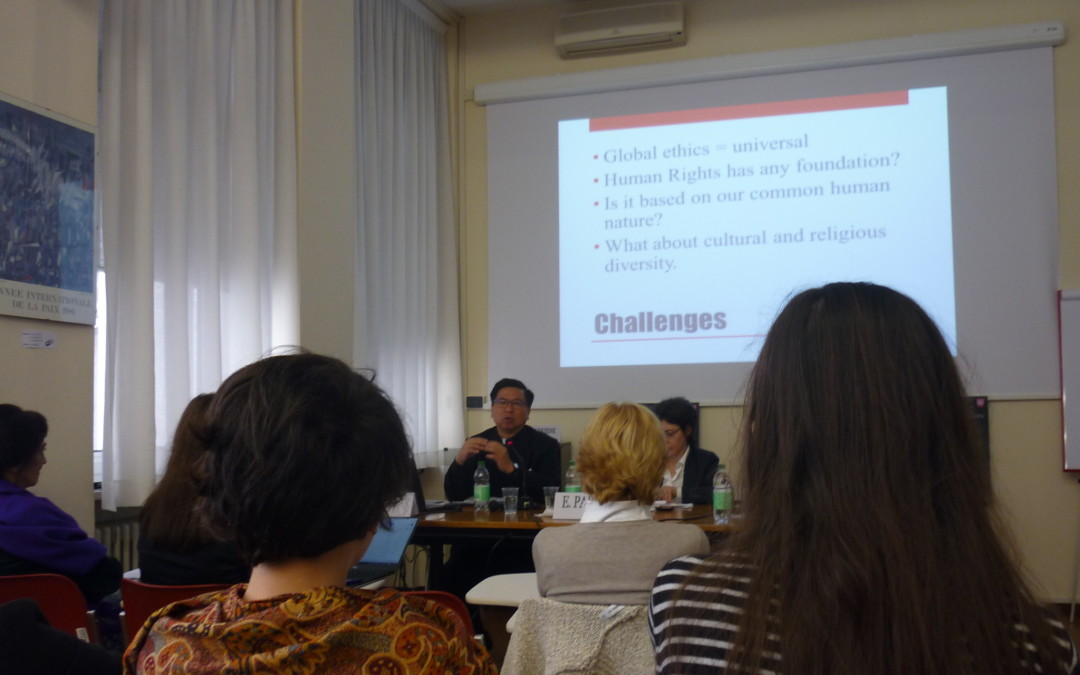UNESCO Chair Fellow Dr. Joseph Tham presented his reflection on “Natural Law and Global Bioethics” at the International Conference on Religions and Human Rights at the Human Rights Centre of the University of Padua on April 15, 2016. The introduction to Tham’s talk is found below. Click here to download a schedule of the event.
Natural Law and Global Bioethics
Fr. Joseph Tham, LC
Introduction
The challenges of ethical behaviors in a global village are more relevant than ever. Edmund Pellegrino once commented, “As the biosphere expands to embrace the whole globe, every nation has a stake in every other nation’s health. For these reasons, the practical and conceptual questions of transcultural biomedical ethics are more sharply defined than in some other domains of knowledge.”[1]
In different parts of the world, the practices of medical tourism, organ trafficking, selective abortion based on gender, and lack of individual informed consent are seen as violations of universal human rights by international standards. At the same time, many of these practices are economically driven because of the availability of relatively inexpensive medical services, body parts, or wombs-for-rent. Due to the general underdevelopment of local bioethical reflection in these parts of the world, it is not uncommon for academics and governing ethical bodies to adopt wholesale secularized bioethical principles.
At the same time, the attempt to catch up economically and technologically in developing countries such as China, India, or Brazil has however created certain unease. Technology and free market economics are not value-free. They often come with a worldview that champions liberalism, individualism, unfettered capitalism, scientism and a blind trust in technological solutions. Modernity is at the same time attractive to many developing countries and at odds with its traditional values.
Can an all-encompassing global bioethics offer a solution to these difficult questions? Others have raised the question of whether or not global ethics of universal human rights might not be neo-colonialism in disguise. For instance, certain Asian scholars claim that values based on traditions, familial relationships and religion which they claim are more compatible with local customs and superior to the Western rights-oriented individualism.[2]
How can the natural law tradition shed light on these challenges? The International Theological Commission document The Search for Universal Ethics: A New Look at Natural Law seeks to address the perennial problem of universality and particularism in ethics. It proposes rationality as the common ground to deduce the universal basis for human rights and dignity, thus avoiding the danger of consensus ethics prevalent in the secularized West on the one hand, and the danger of conflating multicultural and multi-religious settings with ethical relativism on the other.
The paper will finally look at the question of the incommensurability of ethical traditions with a look at the response of Alasdair MacIntyre. While shunning cultural relativism, he recommends mutual understanding of rival moral traditions through in-depth rational debates and encounters in order to arrive at the most valid moral system.
[1] Edmund Pellegrino, Patricia Mazzarella, and Pietro Corsi, eds, Transcultural Dimensions in Medical Ethics. (Frederick, MD: University Publishing Group, 1992), 14.
[2] See Hyakudai Sakamoto, “Towards a new global ethics,” Bioethics 13 (1999): 191–197; Widdows, Heather. “Is Global Ethics Neo-colonialism? An Investigation of the Issue in the Context of Bioethics,” Bioethics 21, no.6 (2007): 305-315.

